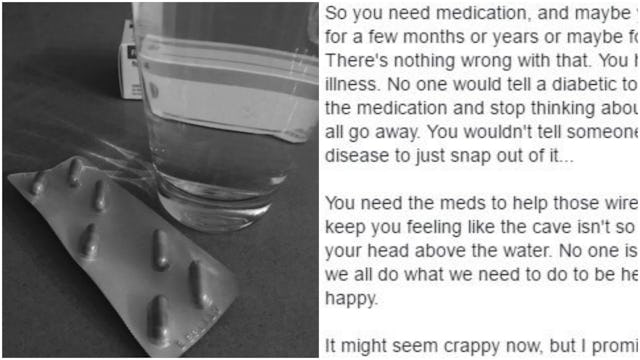Mom's Viral Post On Antidepressants Reminds Us It's Okay 'To Not Be Okay'

Mental illness should be taken as seriously as medical illness when it comes to medication
There’s no denying the existing stigma attached to mental health issues, though awareness and education about these issues helps fight that stigma. Social media, for example, allows people suffering to be candid and reach a lot of people with their message.
Laura Mazza, the mom behind the popular blog “Mum on the Run,” recently wrote a post about antidepressants that went viral.
“So you need to take antidepressants…
“Well… Maybe life has thrown some curve balls at you. Maybe it wasn’t what you expected at this time. Maybe everything is a little bit too much. Maybe getting out of bed every day is hard. Maybe being a friend, a partner, a mother, a father, a daughter or a son is just getting to you. Maybe the wires in your brain have a hard time connecting to each other,” she writes.
What makes this post stand out is how accurately Mazza describes the multitude of reasons to take antidepressants. Depression and anxiety affect everyone differently; one person’s suffering may look completely different from another’s and no one should feel shame about it, yet shame is part of the stigma.
“So… you’re missing some serotonin levels and that’s gotta be hard. That’s you, and that’s your brain. It doesn’t make you or your brain any less wonderful.”
Another thing many people seem to forget is that while lifestyle factors and uncontrollable circumstances in our lives certainly play a lead role when it comes to mental health, so does science.
According to Harvard Health, there are millions–possibly billions–of chemical reactions that make up the dynamic system that is responsible for your mood, perceptions, and how you experience life. Basically, people may experience similar symptoms of depression, but finding a treatment that will work is entirely different from one person to the next.
Mazza gets candid about antidepressants as form of treatment, and how beneficial they can be to those who need them.
“So you need medication, and maybe you’ll be on it for a few months or years or maybe forever. There’s nothing wrong with that. You have an illness. No one would tell a diabetic to just get off the medication and stop thinking about sugar, so it’ll all go away. You wouldn’t tell someone with heart disease to just snap out of it.”
Comparing the “invisibility” of mental illness to purely physical diseases and conditions may help everyone better understand that sometimes, medication is necessary for people to survive just like any other life-threatening condition.
A few days after I had my daughter, I was a complete mess. I felt so out of control mentally that two weeks after she was born, I decided I couldn’t feel this way anymore and I shouldn’t have to. So I went to my doctor, who prescribed me Zoloft (which helped me get through college and my parent’s tumultuous divorce years ago), held my hand, and told me I wasn’t alone.
I was unsure if what I was feeling was the infamous “baby blues” (such a cutesy name for the shittiest hormonal crash ever) or if this was, well, it. I was scared this uncontrollable terror was just how I was going to feel now. So I filled the prescription but kept the bottle in my bathroom cabinet and decided to give myself a few days to see if the panic and sadness I was feeling would dissipate. Eventually, it did ease up a bit and I found myself better able to function. I didn’t take the antidepressants at that time, but knowing those pills were in my cabinet if I needed them saved me. Actually taking them years ago absolutely saved my life. Therapy is great and I still go as often as I can, but sometimes people need antidepressants because therapy just isn’t enough.
Mazza concluded her post by letting us all know there isn’t any shame in knowing you need help, and accepting that help.
“You don’t have to be strong all the time. You don’t have to sweep it under the rug, and carry on smiling for everyone else.
“It’s not a problem to not be okay, it’s only a problem to pretend to be okay when we are not.
“So, you need to take antidepressants… and there ain’t nothing wrong with that.”